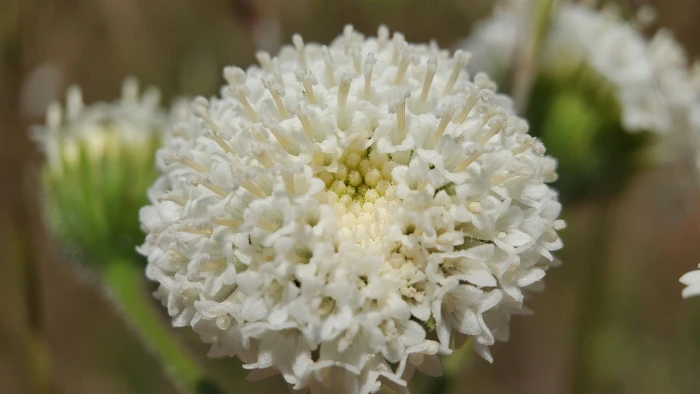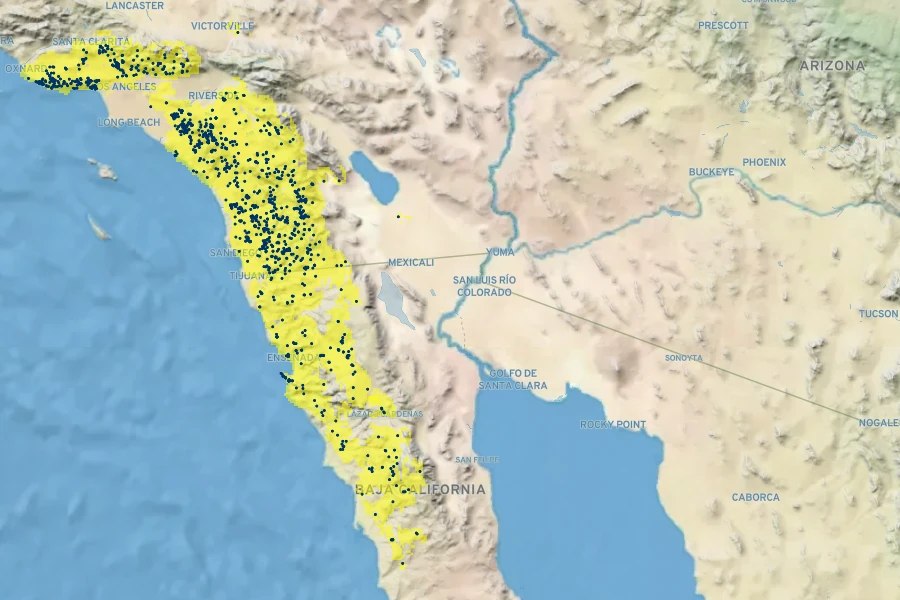White Pincushion
/
(Chaenactis artemisiifolia)
White Pincushion (Chaenactis artemisiifolia)
/

John Cowles
CC BY 4.0
Image By:
John Cowles
Recorded By:
Copyright:
CC BY 4.0
Copyright Notice:
Photo by: John Cowles | License Type: CC BY 4.0 | License URL: http://creativecommons.org/licenses/by/4.0/ | Rights Holder: John Cowles | Publisher: iNaturalist | Date Created: 2023-05-20T12:03:08-07:00 |



























Summary
Chaenactis artemisiifolia, commonly known as White Pincushion, is an annual herb native to the coastal sage scrub and chaparral of the Peninsular Ranges in Southern California and Baja California. It is typically found in open, dry habitats and is adapted to the Mediterranean climate of the region. This plant usually grows under one meter in height but can occasionally reach up to two meters. White Pincushion is characterized by a basal rosette of deeply lobed leaves and fewer, similarly lobed leaves along its erect stem. The distinctive flower heads, blooming from late spring to early summer, are composed of white to pink discoid florets with protruding anthers and curly styles, giving them a pincushion-like appearance. The fruit is a small, compressed achene.
White Pincushion is valued for its drought tolerance and unique floral display, making it a suitable choice for xeriscaping and native plant gardens. It thrives in full sun and requires well-drained soils, often growing in sandy or rocky substrates. While it is not commonly used in large-scale landscaping, it can be an interesting addition to wildflower meadows or naturalistic plantings. Due to its adaptation to dry conditions, it requires minimal water once established. Gardeners should be aware that, as an annual, it completes its life cycle in one year and relies on seed production for future generations.CC BY-SA 4.0
White Pincushion is valued for its drought tolerance and unique floral display, making it a suitable choice for xeriscaping and native plant gardens. It thrives in full sun and requires well-drained soils, often growing in sandy or rocky substrates. While it is not commonly used in large-scale landscaping, it can be an interesting addition to wildflower meadows or naturalistic plantings. Due to its adaptation to dry conditions, it requires minimal water once established. Gardeners should be aware that, as an annual, it completes its life cycle in one year and relies on seed production for future generations.CC BY-SA 4.0
Plant Description
- Plant Type: Herb
- Height: 0.5-1.5 feet
- Width: 1-1.5 feet
- Growth Rate: Moderate
- Flower Color: White
- Flowering Season: Spring, Summer
- Leaf Retention:
Growth Requirements
- Sun: Full Sun
- Drainage: Fast
Common Uses
Bee Garden, Drought Tolerant, Low Maintenance
Natural Habitat
Native to the coastal sage scrub and chaparral of the Peninsular Ranges in Southern California and Baja California
Other Names
Common Names: Meally White Pincushion
Scientific Names: Chaenactis artemisiifolia, Acarphaea artemesiifolia, Acarphaea artemisiifolia, Acicarphaea artemisiifolia
GBIF Accepted Name: Chaenactis artemisiifolia
